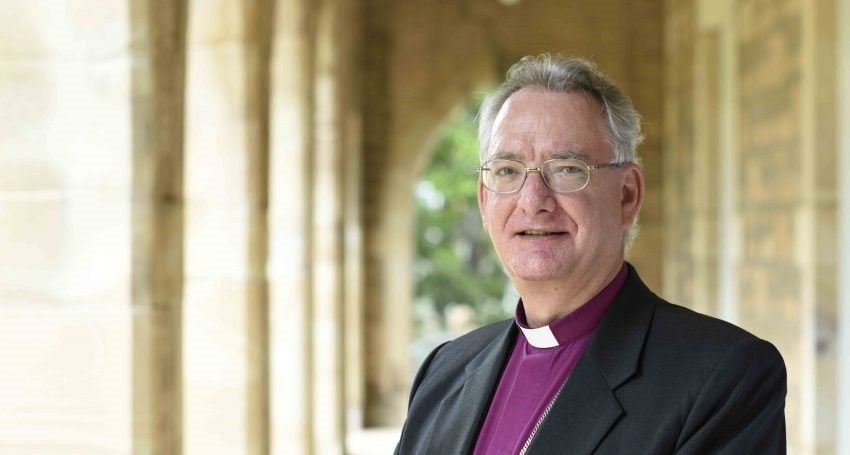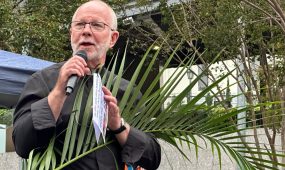Comprehensive Anglicanism is about dispositions of the heart
Reflections
“We should look expectantly for those gifts in each other and see each other as gifts to the body. At root, these spiritual attitudes, these dispositions of the heart, supporting and sustaining the ongoing dialogue in the face of tensions and difference, are the bedrock of comprehensive Anglicanism,” says Archbishop Phillip Aspinall AC

In my Address to Synod last year I described what I understand by the term ‘Comprehensive Anglicanism’. It refers to an important and distinguishing feature of how the Anglican Church deals with theological complexity, where Anglicans hold deeply held but differing convictions on some theological and ethical issues. In essence, the idea of Anglican comprehensiveness is about respectful engagement with those who differ.
I said in my Address to Synod:
Comprehensive Anglicanism tries to live with paradox and ambiguity by affirming the truth present in various positions which are in tension with one another. Anglicans attempt to live with apparent contradictions and paradoxes in the belief that God’s spirit will lead us more fully into the larger truth in which ultimately they will be resolved.
If this dynamic of ongoing tensions at the heart of Anglicanism is to be constructive and healthy, and not deteriorate into a state of hostile non-communication, it needs to be underpinned by particular spiritual dispositions, dispositions of the heart and spirit. It’s difficult to remain engaged with those with whom you differ. It requires a maturity to maintain respect, openness to the truth of their insights, preparedness to disagree and to stay in relationship.
There must be humility. Participants must remain open to the possibility that others with whom they differ may have grasped something of the truth which they themselves are yet to see. In other words, I may learn something from you of which I am not yet aware. In this way, even though we disagree, I am invited to see you as a gift from God who can be a channel of grace to me, enabling me to grow in truth and godliness. In this way I am to treasure you as a means of grace, rather than merely tolerate you or worse still, seek to convert or exclude you.
Advertisement
As St Paul reminded the church in Corinth (1 Cor 12), no one part of the church can say to another, ‘We don’t need you.’ And as he reminded the church in Rome (Romans 12) we who are many are one body in Christ. Individually we are members of one another. God gives diversity and variety so that the one body can be full, complete, healthy and vital.
Our minds and hearts need to embrace the expectation that each other person here bears gifts from God for building up the body of Christ to serve God’s mission in the world. We should look expectantly for those gifts in each other and see each other as gifts to the body. At root these spiritual attitudes, these dispositions of the heart, supporting and sustaining the ongoing dialogue in the face of tensions and difference, are the bedrock of comprehensive Anglicanism.
Such an identity and culture would provide enormous impetus to God’s mission to heal and renew the world. Societies around the globe are fractured and polarised in all sorts of ways. ‘Cancel-culture’ is rife. We are desperate to hear the truth and good news that every person bears the image of God, is of infinite worth and that, even though we differ and disagree, it is possible to relate to each other with respect, generosity, patience, gentleness.
Advertisement
I hope and pray we can embrace and cultivate such an Anglican identity throughout this diocese and be a shining light in the Australian Church and beyond to the world God calls us to serve and heal in Christ’s name.
Coincidently I have been reading a recent newsletter from the Taizé community in which Br Alois, Prior of Taizé, says:
Helping unity to grow requires first of all creating bonds of trust. But far too oſten human relations are imperilled by mistrust. Verbal violence is more and more common in public debate and in social media, and people are manipulated by fear. How should we respond to such aberrations?
We can choose to listen and enter into dialogue. This does not mean telling the other person we share their opinion if this is not the case, but instead doing everything we can to continue a conversation with those who think differently than we do. Let us try and do all in our power to avoid a breakdown in dialogue.
Let us resolve never to stick a label onto anyone, and never to pass on prejudices. No one should be reduced to a particular action or opinion of theirs. And a disagreement, even a radical one, can be expressed without aggression, though we must admit that at times, in the face of certain situations of injustice, anger must be expressed.
There are reflexes of protecting one’s own identity that aggravate the riſts in our societies, and this is also true in Christian communities. Instead of defining ourselves in opposition to others, can we develop an identity and a sense of belonging that does not exclude openness to others?
“The truest and most intimate friendship can exist between people who think differently about essential matters. This naturally involves an element of pain, but it makes our friend still more dear to us.” – From the French philosopher Jacques Maritain in 1970.
As we seek to practise respectful engagement in this Diocese there is much at stake, not least of which is staying true to the principles of Anglican comprehensiveness, and thereby modelling respectful engagement to the wider community.
Yours in Christ
The Most Reverend Dr Phillip Aspinall AC
Archbishop of Brisbane






